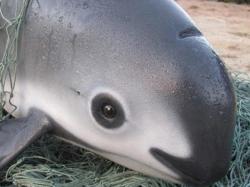Court Of Appeals Upholds US Ban On Mexican Seafood Imports To Save Vaquita
December 3, 2018 | 3 min to read

WASHINGTON— In a victory for one of Earth’s most endangered marine mammals, a third U.S. court decision upheld a four-month-old ban on importing Mexican shrimp and other seafood caught with gillnets that drown vaquita porpoises.
Rejecting a Trump administration legal challenge, the U.S. Court of Appeals for the Federal Circuit confirmed a preliminary order implementing a federal law that requires a ban on seafood imported from Mexico’s Upper Gulf of California and caught with gillnets that drown the vaquita porpoise. Gillnets kill about 50 percent of the rapidly dwindling vaquita population every year.
“The federal agencies charged with protecting the vaquita should focus their resources on saving the last of these animals, rather than continuing to lose in the courtroom,” said Giulia Good Stefani, staff attorney with the Natural Resources Defense Council (NRDC). “Immediate pressure on Mexico to ban all gillnets in the upper gulf and to clear the area of illegal nets is necessary now for the vaquita’s survival.”
Conservation groups initially filed suit in the U.S. Court of International Trade in New York City in March and secured a preliminary ban on vaquita-killing imports in July. The departments of Commerce, Treasury and Homeland Security, which are charged with banning imports that are contributing to the vaquita’s extinction, have tried and failed to modify or undue the import ban three times.
“This victory helps U.S. consumers fight the vaquita’s extinction,” said Sarah Uhlemann, international program director at the Center for Biological Diversity. “The seafood embargo will force Mexico to finally remove dangerous gillnets and save these graceful porpoises before it’s too late.”
Today’s decision is critical to the survival of the remaining 15 vaquita. Vaquita reside in only one place on the planet — the upper Gulf of California. Fishing with gillnets is driving the vaquita to extinction because the small porpoise is easily entangled and drowned in these dangerous nets.
The Marine Mammal Protection Act requires the U.S. government to ban seafood imports from foreign fisheries that kill or injure marine mammals, including the vaquita, at a rate above U.S. standards. Mexico’s efforts to stop the bycatch of the vaquita does not meet U.S. standards.
Over the past 20 years, 95 percent of the population has been lost. In recent years the vaquita’s decline has accelerated. Scientists predict that the vaquita will be extinct soon, possibly even by 2021, if Mexican fishing practices and law-enforcement efforts remain unchanged.
Mexico has failed to permanently ban all gillnets in the vaquita’s habitat, despite repeated recommendations by scientists and evidence that the use of gillnets by any fishery — in or adjacent to the vaquita’s range — will undeniably lead to the species’ extinction.
“The U.S. government is wasting its time and facilitating the extinction of the vaquita by continuing its efforts to reverse the court’s order,” says DJ Schubert, a wildlife biologist with the Animal Welfare Institute. “It’s time for the U.S. government to accept the opinion, ensure full implementation of the ban and continue to work with the government of Mexico to save the vaquita.”
The Natural Resources Defense Council (NRDC) is an international nonprofit environmental organization with more than 3 million members and online activists. Since 1970, our lawyers, scientists, and other environmental specialists have worked to protect the world’s natural resources, public health, and the environment. NRDC has offices in New York City, Washington, D.C., Los Angeles, San Francisco, Chicago, Bozeman, MT, and Beijing. Visit us at www.nrdc.org and follow us on Twitter @NRDC.
The Animal Welfare Institute (awionline.org) is a nonprofit charitable organization founded in 1951 and dedicated to reducing animal suffering caused by people. AWI engages policymakers, scientists, industry, and the public to achieve better treatment of animals everywhere — in the laboratory, on the farm, in commerce, at home, and in the wild.
The Center for Biological Diversity is a national, nonprofit conservation organization with more than 1 million members and online activists dedicated to the protection of endangered species and wild places.
Source: The Center for Biological Diversity
